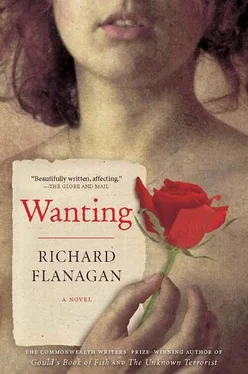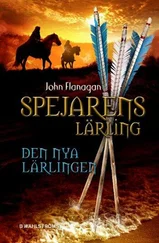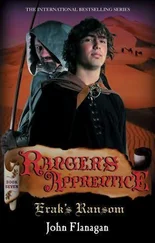‘You can take whatever you want,’ said the seamstress. ‘Just don’t take me down.’
Mathinna understood that meant she, too, could indulge in the hot pleasure of rum and tea spiced with cinnamon, for which she quickly acquired a strong appetite.
Mrs Dellacorte and her black pug dog, Beatrice, ruled the taproom with an icy ruthlessness. Whoever irritated the mistress or her dog were no longer spoken of or with, and a second offence saw you thrown out. Beatrice, when not in the lap of Mrs Dellacorte or wandering around tabletops licking food off plates with a hideous tongue of reptilian length and dexterity, sat on a filthy lambskin at the entrance of a long dark hall, wheezing worse than a dying consumptive.
In a darkened parlour was Mrs Dellacorte’s prize possession, set on a rammed dirt floor: a billiard table with one broken leg resting on a butcher’s old chopping block. Hung above the fireplace, a portrait of Mrs Dellacorte as a young woman of some beauty looked across at the table, as if in a final plea—for the hope of something better? forgiveness? love? For Mrs Dellacorte lived in a loveless universe, the horror of which she kept at bay with what lay strewn over the billiard table’s worn felt: mementos and keepsakes of her late lover, a womanising spendthrift who claimed to be of Hapsburgian lineage.
There were scabbards without swords, compasses without needles, even an astrolabe with a bent alidade, along with several newspapers written in a strange, unreadable script, which Mrs Dellacorte said was Hungarian. She claimed these recorded her husband’s feats of arms in several forgotten wars. All this was shown to any guest she considered of consequence, to establish herself as a woman of position as well as passion. The relics were, however, out of bounds to everyone else.
Whatever transaction passed between the orphanage and the seamstress, who was meant to provide for Mathinna until she was eighteen, none passed between the seamstress and Mathinna. She scrounged scraps and stole drinks and, receiving no pay, took to getting pennies and bread for what Sir John had stolen. She set no store by it. It wasn’t pleasant—but then, what in her life was? It was the Devil’s world, after all. She even sometimes took an odd comfort in it: it can be no worse than this, she would tell herself as they slobbered and grunted and shoved.
But it could, and the worst was when the memories crowded together, of her people, their kindnesses, their laughter, the singing and dancing around the campfire. In between, she went to the Queen’s Domain, where she caught green and red rosella parrots and sold them to those who liked eating them in pies.
She noticed a weeping between her legs and a general itching. She realised she had the pox. Since just about everyone else she knew did too, it seemed as unremarkable, if as annoying and occasionally painful, as the lice that also beset her. A friend gave her a phial of quicksilver to drink. She vomited, her nails all fell out, and after a time the weeping and itching disappeared.
Mostly she longed for sleep and its sweet oblivion. The moment she reached her cot and found her way under a possum-skin rug, she felt safe.
One night a very tall, very skinny old man in a splendid coat came into the widow’s back room. He had, another girl told Mathinna, made his money speculating, using a small inheritance to buy a half-share in a whaling expedition that had multiplied into several whaling ships. On seeing her, he smiled. He had only talked to her for a few minutes before she insisted that if he wanted her, he would have to pay like the other men. His smile halted, and he opened his bony fingers to reveal the incomprehensible sight of a guinea coin.
It was a night of sleet, and they went not to her normal workplace, a stall left empty for the purpose in the stables, but stole into Mrs Dellacorte’s slightly less chill parlour of sacred memory. But when Mathinna went to pull her skirts up, he halted her, sat her down, and gave her another guinea coin, along with a question.
‘Miss Mathinna—do you not remember me?’
Only when he fished out a button accordion from his saddle bag did she recognise him. It was Mr Francis Lazaretto. As he played The Ballad of the Cyprus Brig , his voice captured her one last time. When he slowed the song, and strange, sad, sweet sounds came from that battered little bellows, she span this way and that in slow evocation of the joyful dancing his music had once inspired in her. When he went to leave, he spoke just one sentence that meant nothing to her.
‘More forms of consummation than one.’
And at that moment the door opened, and in strode a panting black pug, long tongue lolling, followed by Mrs Dellacorte. She took just one look at the black girl sitting on the billiard table who had so obviously profaned her most precious shrine, and as Mathinna scampered out behind Francis Lazaretto, Mrs Dellacorte told her not to bother coming back.
While riding in his carriage to a meeting with Pedder to discuss an enticing business proposal—a large pastoral run in the burgeoning new colony of Port Phillip—Montague saw a young Aboriginal woman staggering towards him.
‘I hardly recognised her, she was that changed—and none of it for the better,’ Montague later told Pedder. He had suffered a stroke. One side of his mouth drooped with a palsy and his words slurred. ‘Her face was bloated and bleeding from some thrashing or fall, while her body seemed all sticks.’
‘I’m told she wanders the town, drinking in the gutters,’ Pedder replied.
‘I pulled the carriage blind down, just so,’ said Montague—here he leant forward and pretended to be spying out a narrow strip of glass—‘well, you understand.’ They laughed at the idea of the wretch embarrassing him. ‘But here was the queerest thing—she spotted me and just smiled! Can you believe it? It was as though everything for her was utterly real and at the same time without any foundation—including me!—and somehow this seemed to keep her, who is constantly humiliated, jeered at by any who see her, who I am told routinely has mud or stones hurled at her, in this smiling state of some deranged superiority.’
‘I have seen it myself,’ said Pedder. ‘She roams the streets as if it were all a dream.’
But something about Mathinna’s fall and the way she now deported herself troubled both men. It was hard to know whether her seeming acceptance was submission or simple-mindedness or the most profound revolt, a contempt greater than any visited on her by pox-raddled redcoats, shepherds or ticket-of-leave men.
‘She was many things,’ said Montague, lost with his own thoughts. ‘She was never simple-minded.’ An exclamation mark of drool fell from his lip.
At times Mathinna could seem naturally haughty, as if her peculiar history had indeed bequeathed that very majesty she had once been promised, as though from her full height of five foot four she had seen everything there was of people and somehow now stood above them, aware of their failings but without judgement. Some in Hobart Town regarded it as nigger stupidity, others as arrogance; some said it was just the grog, others recalled older tales of her witchery. She was easily reviled, laughed at and sometimes spat upon, but the thought of her played uneasily on people’s minds.
She continued trading her body, because, along with a little writing and the quadrille, it was what she had learnt and finally come to understand as her only possibility for survival. Loathsome as Mrs Dellacorte’s establishment had been, it had offered a dry cot and palliasse, a fire, and even if the food was bad, there was always enough of it, and the worst men were thrown out if they roughed up a girl.
Now the sailors and old lags and soldiers took her ever more drunkenly, hopelessly, violently, painfully, in anger and with tears, with their rotten broken mouths and foul breath tonguing hate and begging forgiveness, rarely curious and generally desperate to be rid of her the moment they were done. That, if little else, suited her.
Читать дальше












